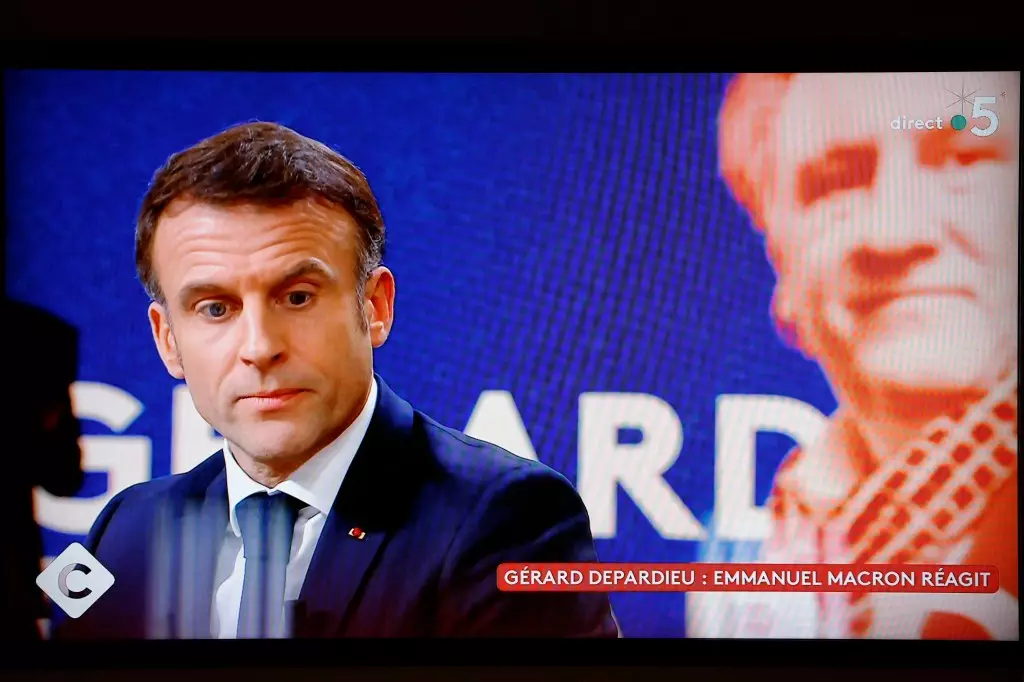French President Emmanuel Macron has recently expressed his support for Gérard Depardieu, an actor whose reputation has been tarnished by multiple allegations of sexual assault. In this article, we will critically analyze Macron’s stance, the implications of his statements, and the underlying issues surrounding the controversy.
During an interview on the talk show C à Vous, Macron categorically stated that he would not participate in a “witch hunt” against Depardieu. He even went as far as to label himself a “great admirer” of the actor, claiming that Depardieu had made France proud. Macron’s remarks have sparked a debate regarding the responsibility of influential figures in supporting individuals accused of sexual misconduct.
The release of the France 2 documentary Complément d’Enquête shed light on Depardieu’s questionable behavior towards women both on and off the set. The documentary revealed that actress Charlotte Arnould had filed a rape charge against Depardieu in 2018. Additionally, it unveiled a sexual misconduct complaint lodged by another actress, Hélène Darras, in September of the same year. While an official investigation is pending, the documentary also presented evidence of Depardieu’s inappropriate behavior towards a young female interpreter during a visit to North Korea in 2018.
The documentary’s findings have triggered a public outcry, leading previously silent industry figures like actresses Anouk Grinberg and Brit Van Hoof to speak out about the culture of silence surrounding Depardieu. This development underscores the need for a deeper examination of the systemic issues that enable such behavior within the entertainment industry.
French Culture Minister Rima Abdul Malak, in response to the documentary, announced a procedure to determine if Depardieu should face sanctions or potentially be stripped of the Legion Of Honor he received from former French President Jacque Chirac. She described Depardieu’s behavior as disrespectful, unworthy, and shameful to France. However, Macron criticized the minister’s proposal, arguing that the Order of the Legion of Honor was not intended for moral preaching.
This divergence in opinions between the President and the Minister highlights a larger question within society: how should alleged sexual misconduct be addressed by those in positions of power? Macron’s stance challenges the notion of institutional accountability and sparks a debate about the proper response to such serious allegations.
In a surprising turn of events, Spanish journalist Ruth Baza lodged a rape complaint against Depardieu regarding an incident that allegedly took place during an interview in Paris in 1995, when she was only 23 years old. This new accusation adds further weight to the already mounting allegations against Depardieu, further complicating the situation for both the actor and those involved in the decision-making process.
While it is important to acknowledge the principle of innocence until proven guilty, Macron’s categorical support for Depardieu raises valid concerns. By openly expressing his admiration for an accused individual, the President may be sending a message that minimizes the gravity of the allegations and diminishes the voices of the victims. This could potentially discourage other survivors from coming forward.
Additionally, the President’s assertion that he will not engage in a “witch hunt” can be seen as a mischaracterization of the pursuit of justice. Holding individuals accountable for their actions should not be equated with a witch hunt, as it undermines the seriousness of the issue at hand.
While it is crucial to respect due process and the principle of innocence until proven guilty, leaders should exercise caution in publicly supporting individuals accused of serious crimes. This is especially important when it comes to alleged sexual misconduct, as it affects not only the credibility of the victims but also the overall societal perception of such crimes.
Instead of prematurely dismissing allegations or openly defending the accused, leaders should adopt a more balanced approach. This includes recognizing the need for thorough investigations, supporting survivors, and ensuring that legal processes unfold free from undue influence or bias.
The controversy surrounding Gérard Depardieu’s alleged sexual misconduct highlights the complexities inherent in addressing such issues, especially when influential figures express unequivocal support for the accused. Macron’s endorsement of the actor raises concerns about the credibility of the accusations, as well as the broader cultural impact on survivors of sexual assault. By critically examining the President’s stance, we are reminded of the importance of balanced approaches that prioritize justice, due process, and survivor support.

